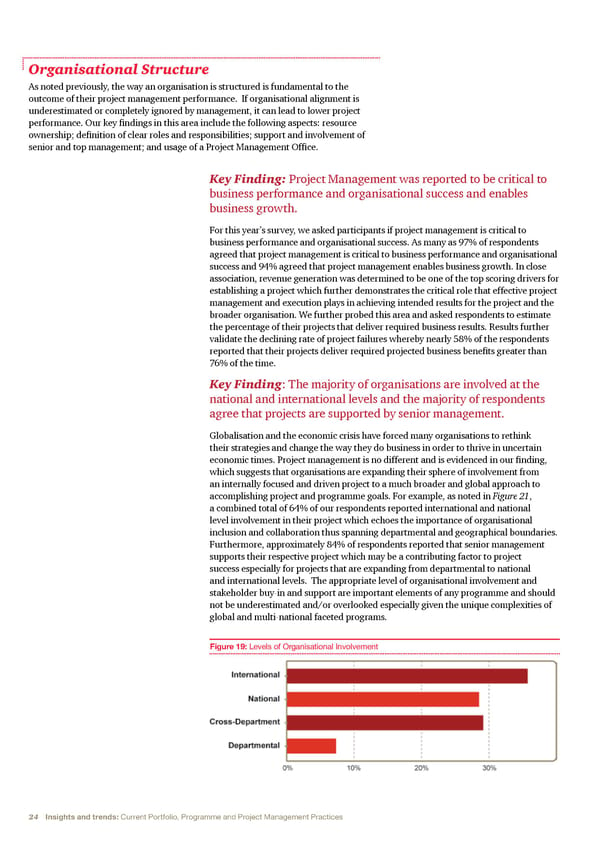Organisational Structure As noted previously, the way an organisation is structured is fundamental to the outcome of their project management performance. If organisational alignment is underestimated or completely ignored by management, it can lead to lower project performance. Our key findings in this area include the following aspects: resource ownership; definition of clear roles and responsibilities; support and involvement of senior and top management; and usage of a Project Management Office. Key Finding: Project Management was reported to be critical to business performance and organisational success and enables business growth. For this year’s survey, we asked participants if project management is critical to business performance and organisational success. As many as 97% of respondents agreed that project management is critical to business performance and organisational success and 94% agreed that project management enables business growth. In close association, revenue generation was determined to be one of the top scoring drivers for establishing a project which further demonstrates the critical role that effective project management and execution plays in achieving intended results for the project and the broader organisation. We further probed this area and asked respondents to estimate the percentage of their projects that deliver required business results. Results further validate the declining rate of project failures whereby nearly 58% of the respondents reported that their projects deliver required projected business benefits greater than 76% of the time. Key Finding: The majority of organisations are involved at the national and international levels and the majority of respondents agree that projects are supported by senior management. Globalisation and the economic crisis have forced many organisations to rethink their strategies and change the way they do business in order to thrive in uncertain economic times. Project management is no different and is evidenced in our finding, which suggests that organisations are expanding their sphere of involvement from an internally focused and driven project to a much broader and global approach to accomplishing project and programme goals. For example, as noted in Figure 21, a combined total of 64% of our respondents reported international and national level involvement in their project which echoes the importance of organisational inclusion and collaboration thus spanning departmental and geographical boundaries. Furthermore, approximately 84% of respondents reported that senior management supports their respective project which may be a contributing factor to project success especially for projects that are expanding from departmental to national and international levels. The appropriate level of organisational involvement and stakeholder buy-in and support are important elements of any programme and should not be underestimated and/or overlooked especially given the unique complexities of global and multi-national faceted programs. Figure 19: Levels of Organisational Involvement 24 Insights and trends: Current Portfolio, Programme and Project Management Practices
 Insights and Trends Page 24 Page 26
Insights and Trends Page 24 Page 26